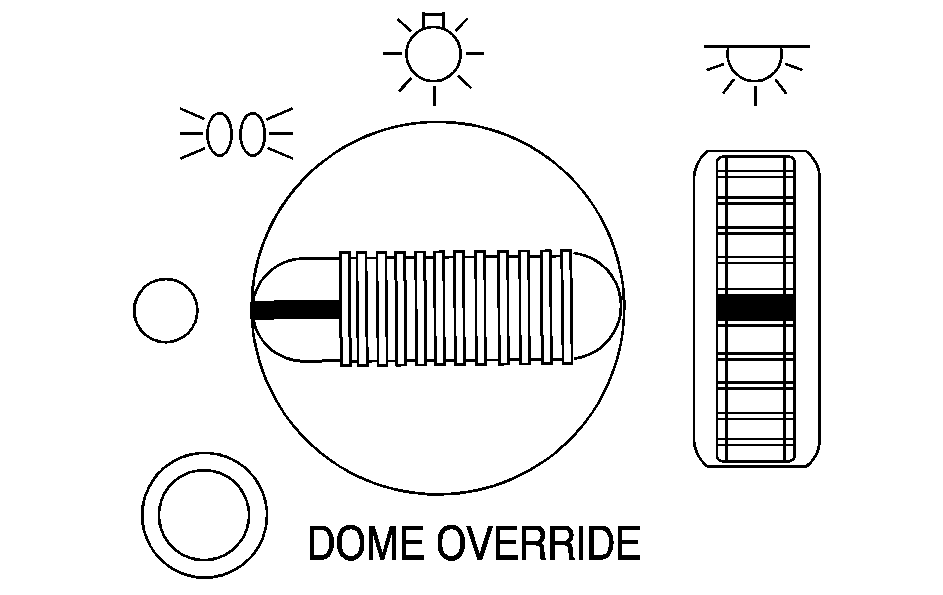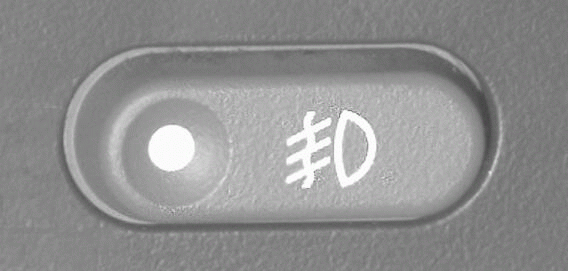
The control on the driver's side of the instrument panel operates the exterior lamps.
The exterior lamp control has three positions:
(Off): Turn the exterior lamps control all the way counterclockwise to turn off the lamps and put the system in automatic headlamp mode.(Parking Lamps): Turning the exterior lamps control to this position turns on the parking lamps together with the following:
| • | Sidemarker Lamps |
| • | Taillamps |
| • | License Plate Lamps |
| • | Instrument Panel Lights |
Automatic Headlamp System
When it is dark enough outside, your automatic headlamp system will turn on your headlamps at the normal brightness along with other lamps such as the taillamps, sidemarker, parking lamps and the instrument panel lights. The radio lights will also be dim.
Your vehicle is equipped with a light sensor on the top of the instrument panel under the radio speaker grill. Be sure it is not covered or the system will be on whenever the ignition is on.
The system may also turn on your headlamps when driving through a parking garage, heavy overcast weather or a tunnel. This is normal.
There is a delay in the transition between the daytime and nighttime operation of the Daytime Running Lamps (DRL) and the automatic headlamp systems so that driving under bridges or bright overhead street lights does not affect the system. The DRL and automatic headlamp system will only be affected when the light sensor sees a change in lighting lasting longer than the delay.
To idle your vehicle with the automatic headlamp system off, set the parking brake while the ignition is off. Then start your vehicle. The automatic headlamp system will stay off until you release the parking brake.
As with any vehicle, you should turn on the regular headlamps when you need them.
You may be able to turn off your automatic headlamp system. See "Daytime Running Lamps (DRL)" later in this section for more information.
If you start your vehicle in a dark garage, the automatic headlamp system will come on immediately. Once you leave the garage, it will take approximately one minute for the automatic headlamp system to change to DRL if it is light outside. During that delay, your instrument panel cluster may not be as bright as usual. Make sure your instrument panel brightness control is in the full bright position. See "Instrument Panel Brightness Control" under Interior Lamps .
Lamps On Reminder
A reminder chime will sound when your headlamps or parking lamps are manually turned on, the driver's door is opened and your ignition is in OFF, LOCK or ACCESSORY. To turn the chime off, turn the control counterclockwise or turn the instrument panel brightness thumbwheel down to the fully dimmed position. In the automatic mode, the headlamps turn off once the ignition key is in OFF.
Daytime Running Lamps
Daytime Running Lamps (DRL) can make it easier for others to see the front of your vehicle during the day. DRL can be helpful in many different driving conditions, but they can be especially helpful in the short periods after dawn and before sunset. Fully functional daytime running lamps are required on all vehicles first sold in Canada.
The DRL system will make your headlamps come on at reduced brightness when the following conditions are met:
| • | The ignition is on, |
| • | the exterior lamp control is in OFF, |
| • | the sensor detects daytime light, |
| • | an automatic transmission is not in PARK (P), and |
| • | the parking brake is released. |
When the DRL are on, only your headlamps will be on. The taillamps, sidemarker and other lamps won't be on. The instrument panel won't be lit up either.
When it begins to get dark, the headlamps will automatically switch from DRL to the regular headlamps.
The DRL system on some vehicles may turn off temporarily while the turn signals are activated.
To idle an automatic transmission vehicle with the DRL off, put the transmission in PARK (P). To idle a manual transmission vehicle with the DRL off, set the parking brake. The DRL will stay off until you shift out of PARK (P) or release the parking brake.
The following does not apply to vehicles sold in Canada.
When necessary, you may turn off the automatic headlamp system and the Daytime Running Lamps (DRL) feature by following the steps below:
- Turn the ignition to RUN.
- Press the DOME OVERRIDE button four times within six seconds. After the fourth press of the button, a chime will sound informing you that the system is off. The system will revert back to the automatic on mode when the ignition is turned to OFF and then to RUN again.
- To return to the automatic mode, push the DOME OVERRIDE button four times within six seconds (a chime will sound), or turn the ignition to OFF and then to RUN again.
As with any vehicle, you should turn on the regular headlamp system when you need it.
Fog Lamps
Your vehicle may be equipped with fog lamps. Use your fog lamps for better vision in foggy or misty conditions. Your parking lamps or headlamps must be on for your fog lamps to work.

The fog lamp button is located on the instrument panel near the lamp control.
Press the button to turn the fog lamps on. Press the button again to turn them off. A light will glow in the button when the fog lamps are on.
Fog lamps will go off whenever your high-beam headlamps come on. When the high-beams go off, the fog lamps will come on again.
